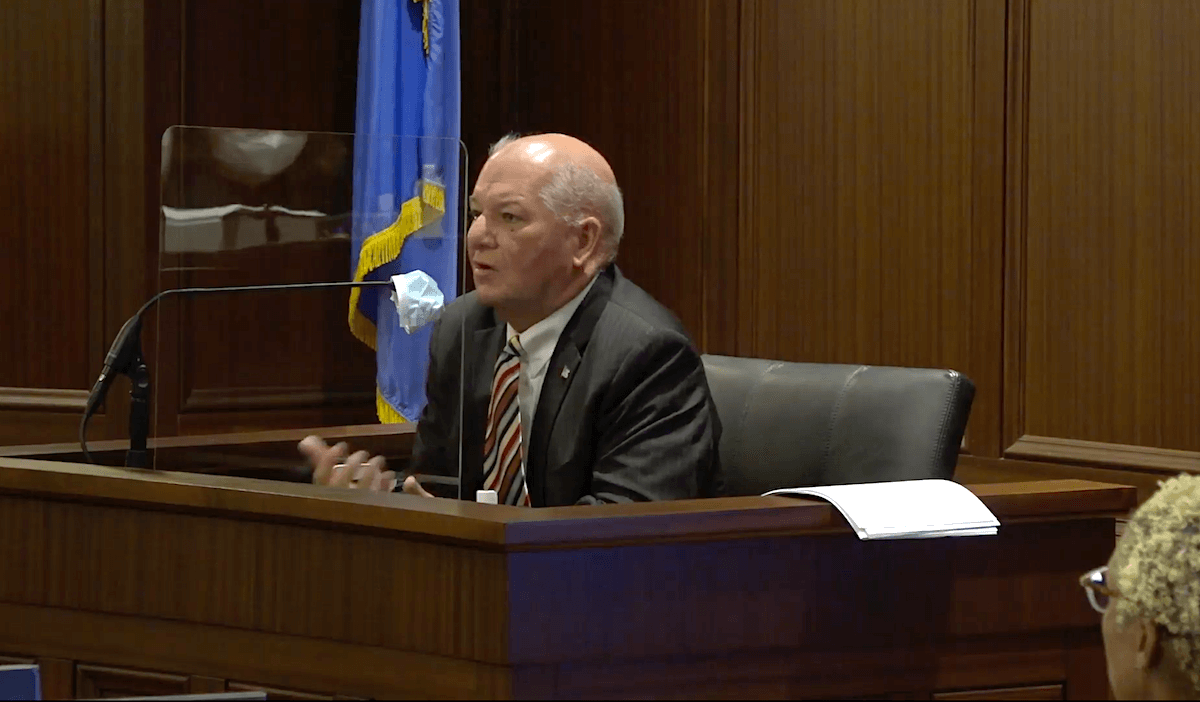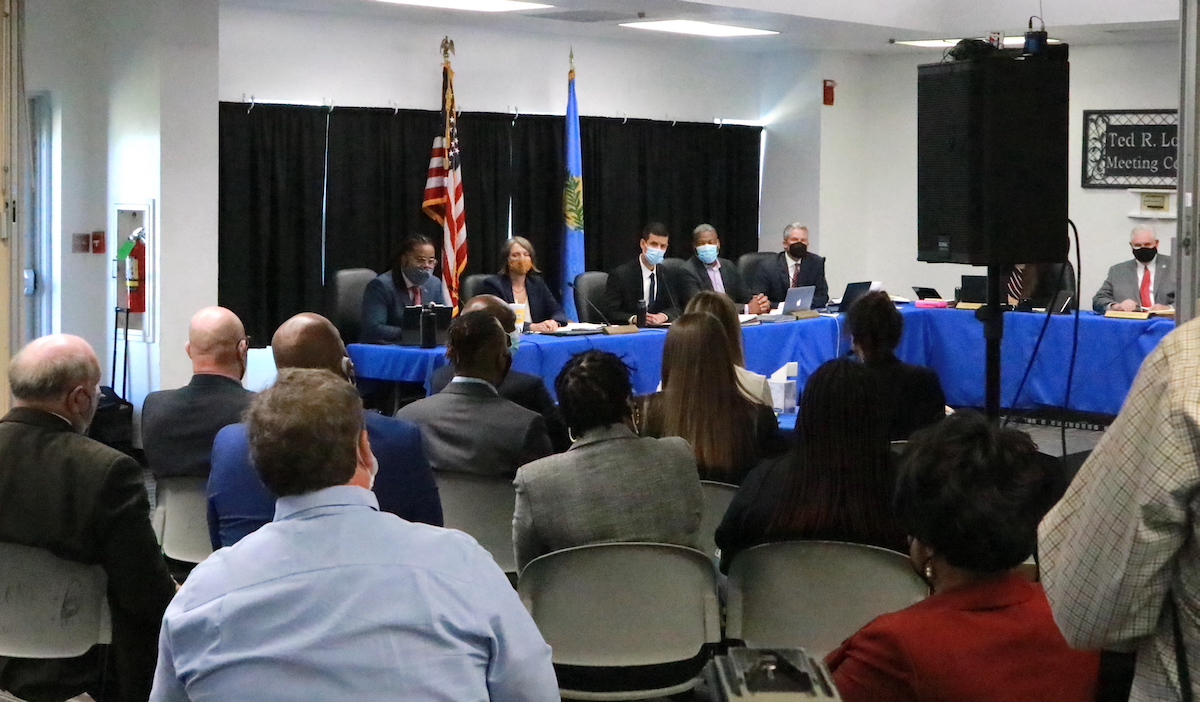Oklahoma County District Attorney David Prater asked and received permission from a judge today to impanel a grand jury to examine — at a minimum — the operation of the Oklahoma County Jail and the state’s Pardon and Parole Board, which controversially recommended the early release of a man who subsequently confessed to murdering a woman and cooking her heart with potatoes.
“One purpose for calling an Oklahoma County grand jury is for it to investigate credible allegations that involve official corruption and/or official neglect that are alleged to have been committed by state and/or county officials,” Prater wrote in his application.
Once a county grand jury becomes impaneled, it is not limited in its investigatory scope. Grand juries can issue subpoenas, compel the appearance and testimony of witnesses under oath, and issue criminal indictments.
Oklahoma County Presiding Judge Ray Elliott approved Prater’s request, ordering the county court clerk to summon 99 citizens qualified to serve as jurors to the courthouse for consideration at 8:30 a.m. Monday, Oct. 18.
Prater’s request comes one day after Gov. Kevin Stitt announced he was “not accepting” the Pardon and Parole Board’s recommendation to commute the death sentence of Julius Jones, who was convicted in the 1999 murder of Edmond father Paul Howell.
While Prater has repeatedly criticized the Pardon and Parole Board and said some of its members were conflicted when handling the Jones commutation request, the district attorney’s newest inquiry into the parole board is expected to start by examining the recommendations of release for two other men and broader questions of whether incarcerated people were re-docketed for commutation in error.

Lawrence Anderson case being investigated
In January 2020, the Pardon and Parole Board voted 3-1 to recommend the early release of Lawrence Anderson, who had received a 20-year prison sentence in 2017 for drug crimes.
Anderson originally applied for commutation but was denied in July 2019. He was re-docketed in October 2019, and his Stage 2 hearing was held in January 2020, with the board recommending a commutation to the governor. Stitt approved the recommendation in June 2020, commuting Anderson’s sentence to nine years. Anderson was released Jan. 16, 2021, after serving three years in prison.
Less than a month later, Anderson was arrested for a grisly triple-murder. According to the Oklahoma State Bureau of Investigation, Anderson confessed to killing and cutting the heart out of Andrea Lynn Blankenship, a Chickasha woman who lived near his aunt and uncle.
OSBI says Anderson then cooked Blankenship’s heart at his aunt and uncle’s house, killing Leon Pyle, wounding Pyle’s wife and killing Kaeos Yates, their 4-year-old granddaughter.
On March 3, The Oklahoman reported that Anderson may have been released by mistake, as records show his Stage 1 commutation request had been denied in July 2019, which should have stopped it from moving forward in the process.
Faced with that potential error, Stitt requested that the OSBI investigate how Anderson and a second inmate, Jonathan Perez, ended up back on a commutation list after recent denials. One issue under examination appeared to be an internal Pardon and Parole Board policy change in 2018 that was supposed to make incarcerated individuals wait three years after a denial before they could re-apply for commutation.
In March, then-Attorney General Mike Hunter appointed former U.S. Attorney Brian Kuester as a special prosecutor tasked with the investigation into Anderson’s release. Hunter resigned in May, and the status of OSBI and Kuester’s investigation is unclear. (The state’s 18th multi-county grand jury, impaneled in March 2020, recently concluded its 18-month term but did not directly mention the Pardon and Parole Board investigation in its final report.)
Asked Sept. 24 about the state investigation into the Pardon and Parole Board had concluded, Stitt said he had not been provided any information.
“I have not heard the final conclusion on that. I’ll reach out. But of course we want to make sure that the Pardon and Parole (Board) is following the law, and as far as I’m concerned they are,” Stitt said. “The director there, Tom Bates, is running that agency, and I have full faith that he is doing everything by the book.”
Stitt’s chief of communications, Charlie Hannema, added: “That investigation is moving through the channels. It just hasn’t been finished yet.”
Bates told NonDoc on Wednesday that he cannot comment on Prater’s Oklahoma County grand jury application because it is his understanding that the OSBI investigation is pending. Bates became director of the agency in September 2020.
‘We have found people that were re-docketed in error’

Prater’s application for an Oklahoma County grand jury — requested Wednesday morning of Oklahoma County Chief Administrative Judge Ray Elliott — seems to indicate that he believes the state’s Pardon and Parole Board investigation has stalled. The board meets in Oklahoma County.
“The latest multi-county grand jury has now adjourned sine die this month, and I am informed that it is unlikely that another multi-county grand jury will be empaneled until January 2022, if then,” Prater wrote. “It is my judgment as district attorney for District Attorney District 7 that the convening of a county grand jury having jurisdiction extending throughout Oklahoma County during the time period in which a state multi-county grand jury is unavailable is necessary due to the reported commission of felony crimes and other public offenses.”
In March, Prater sued the Pardon and Parole Board and Stitt to seek an injunction stopping the board from hearing commutation requests owing to alleged violations of state law.
Prater also alleged that board members Adam Luck and Kelly Doyle have conflicts of interest related to their positions with the Center for Economic Opportunities, a national nonprofit that matches people leaving prison with jobs. Luck serves on the CEO board. Until September 2020, Doyle worked as CEO’s deputy executive director for central and midwest regions before shifting to a “special projects” role.
Prater said the Pardon and Parole Board was not notifying district attorneys about pending commutation applications, as required by state law.
In a March interview with NonDoc, Doyle said she believed the board was following the law.
“To my knowledge, yes. However, as you’ve probably been aware the influx of commutation applications in the last two years has been something unseen in the history of the Pardon and Parole Board, and I would say very much our staff capacity was challenged by this influx,” Doyle said. “I couldn’t speak to if there were some notifications that were missed because of this influx.”
She then referenced OSBI’s investigation of the board.
“The reason why the governor called OSBI in is that we have found people that were re-docketed in error when they shouldn’t have been,” Doyle said. “And so I know that’s why OSBI was called in — to have them check out and make sure — to get to the bottom of how that mistake happened, ensure that it’s not a chronic issue and provide clarity on that issue.”
Stitt appointed Doyle and Luck to the Pardon and Parole Board on Feb. 26, 2019. In August 2020, then-Pardon and Parole Board director Steven Bickley resigned after board member C. Allen McCall threatened to accuse Bickley of unspecified criminal activity. McCall had asked Bickley to ask the Attorney General’s Office whether Julius Jones could request a commutation hearing as a death-row inmate.
“While I have found public service fulfilling, I cannot tolerate my current work environment,” Bickley wrote to the board in an email reported by Ben Felder of The Frontier. “Policy disagreements have turned into personal attacks rather than public discussion, board members are actively seeking to create conflict between staff and the executive director, and I have even been threatened for doing my job. It is my sincere hope these issues are alleviated before the next executive director takes his or her post.”
Bickley’s resignation occurred while the board was dealing with the increased workload referenced by Doyle.
A judge for three decades in Comanche County, McCall resigned from the board in July 2021. Another board member, former Chairman Robert Gilliland, resigned in December 2020 for health reasons. Gilliland died in February.
Prater alleges ‘lethal uncorrected mismanagement’ of OK County Jail

In proposing his investigation into the Oklahoma County Jail, Prater noted that the controversial Oklahoma County Criminal Justice Authority — colloquially called the “jail trust” — can be held liable for criminal violations that occur in the jail’s management.
“The Oklahoma State Department of Health has faithfully reported unhealthy and even lethal uncorrected mismanagement of the Oklahoma County Jail that reportedly occurred at least from the beginning of Fiscal Year 2020-2021 and has not since abated, resulting in unhealthy jail living conditions, lack of physical security for both inmates and staff, and even preventable loss of life,” Prater wrote. “A March 28, 2021, report from the Oklahoma State Health Department to the Oklahoma County Jail’s Administrator reported more than 30 serious violations in jail regulations.”
Prater noted that the Oklahoma County Jail “is managed by an administrator, who is a public officer.”
“The Oklahoma County Administrator is appointed by and directly supervised by the Oklahoma County Criminal Justice Authority, a public agency of the State, governed by a Board of Trustees who are individually public officers,” Prater wrote. “Trustees, as public officers not subject to Impeachment, are therefore subject to Removal upon an Accusation brought by a grand jury pursuant to the provisions of [state statute and] may also be subject to criminal penalties.”
Prater sparred with the jail trust even before it was formally created. When the county’s Criminal Justice Advisory Council recommended the creation of a trust to operate the jail, Prater, who also sat on the council, opposed taking a vote to create it.
“I believe it’s more appropriate for the Board of County Commissioners to consider what type of a jail trust — if in fact they do choose to go in that direction — before this body were to recommend any action on whatever jail trust they choose to create,” Prater said in April 2019.
The following year, he successfully filed a motion to intervene in a legal case involving jail trust member Kevin Calvey. Also an elected County Commissioner, Calvey sued the trust he serves on in an attempt to ensure Immigration and Customs Enforcement agents have access to the jail.
“Our overarching interests are the citizens of Oklahoma County and ensuring they have protection from liability that might come from this suit,” Prater said last year. “If this lawsuit were to prevail, it could allow others outside to then point to this intervention by the county commissioners in the operation of the jail trust and say its a sham trust and therefore all of the protections and safeguards in the statutes that relate to the trust go away.”
In January, Prater said his office was looking into issues within the jail, including bed bugs and overcrowding.
RELATED
Long called ‘deplorable,’ the Oklahoma County Jail reaches a crossroads by Matt Patterson
“Those responsible for the operation of the jail may be held criminally liable if evidence exists to prove that they knew of the staffing deficiencies and conditions that contributed to the inmate deaths, and did nothing,” Prater said in a statement.
Following a hostage situation inside the jail in March that resulted in a detainee’s death, Prater amped up his criticism of the trust and the jail administrator it employs.
“It’s the incompetent administration of that jail. It’s the incompetence of the jail trust,” Prater told The Oklahoman. “The jail trust and its administration of the Oklahoma County jail is an abject failure that has cost the lives of inmates, made the environment incredibly dangerous for law enforcement and other jail staff members.”
In April, Prater charged two jail employees with misdemeanor assault and battery of an inmate. That incident occurred under the jail trust’s watch. A third jailer was charged for an incident in 2019 prior to the trust taking over the jail’s day-to-day operations.
On Monday, an item on the Board of County Commissioners agenda referenced the resignation of jail trust member Todd Lamb. A former lieutenant governor, Lamb often missed meetings of the jail trust and attended others virtually.
Read David Prater’s application for a grand jury
(Update: This article was updated at 1:13 p.m. Wednesday, Sept. 29, to include additional information. It was updated again at 1:53 p.m. to clarify information regarding Todd Lamb. It was updated a final time at 8:50 a.m. Thursday, Sept. 30, to note in the headline and the story that Elliott had approved the grand jury.)






















